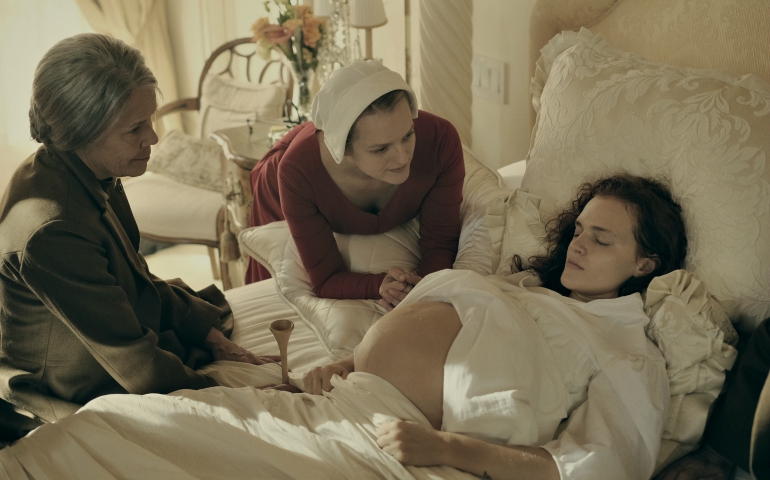
A scene from "The Handmaid's Tale," a TV series adapted from Margaret Atwood's 1985 novel (Hulu/George Kraychyk)
In Margaret Atwood's dystopian novel The Handmaid's Tale, the environmental catastrophe of infertility in the human species meets its match in pre-existing sexism. While lots of people are learning to code for employment purposes these days, this English-major-turned-minister, namely me, wants to help us learn how to "code" culture.
Atwood did a ton of research for her 1985 book, which is now a TV series on Hulu. She swears that everything in her fictional account comes from something that really did happen to real women in her lifetime. The way she turned it into horrifyingly real and prescient fiction was to extend the values in the stories she read into a place a little further than the nonfiction went. Women were forced to have surrogate sex, they were raped, they were denied birth control on behalf of the species, they were used as wombs with legs.
There remains a widespread public perception that infertility rates are increasing — and here environmentalism joins sexism in a weird handshake. Around the time Atwood wrote The Handmaid's Tale, there was evidence that impaired fecundity — physical difficulty either getting pregnant or carrying a pregnancy to term — was on the rise, while 12-month infertility was gradually decreasing. Today, studies have found U.S. fertility rates at their lowest recorded levels.
When we look to code culture, we see Atwood's wisdom and genius in the authorial choice to follow infertility rates and nonfictional stories about women. That literary method can give us a way to understand the codes under the statistics.
When we watch the values assumptions underneath the news story and code culture, we continue to have reasons to be concerned about women, childbearing, evolution and the environment. Note that indeed things can get worse if we don't go to the heart of it and say what needs to be said. Infertility may no longer be an environmental problem but the way people perceive infertility as a woman's issue remains one.
Watch these assumptions, as well.
Health care can only bought and sold, right? That's why people with pre-existing conditions are being removed from insurance. They are too expensive. From the premise of buying and selling health, we move quickly to some being too expensive to matter. The sick are sacrificed.
The president doesn't have to release his tax forms. From there, we move ever so quickly to the president being above the law.
Back to the environmental crisis of infertility. Indeed, it is serious and not a small matter when a species starts to stop reproducing. But women are not the only ones in charge of propagating the species.
I once counseled a couple for the long and expensive time of their infertility. For three years, they spent thousands of dollars on fertility testing and even more on worrying about the technologies of biological implantations. They eventually gave birth to triplets, all of whom survived, when the wife was 43 and after they had given up on their experiments and run out of money.
They now live in Italy on the farm where they both grew up — even though they didn't know each other then. Each was a part of a different family on a large working farm. That fact only matters when you look at their odd and uncanny lives. At the end of their reproductive trials, a doctor finally suggested that the man should have a test regarding his sperm count. It was indeed low, so low that it probably caused the infertility.
If women are wombs with legs, then are men not also sperm with legs? In other words, how can an environmental crisis turn into an oppression of women? It does so by not knowing how to read what has been done to women all along.
Read paychecks of women compared to those of men. Or watch out at your table when a man says, "She was asking for it." Or read the newspaper, or talk to your local police officer about how many rapes he or she has attended to. Follow the domestic violence rate in rich or poor neighborhoods in developed and developing worlds alike.
Infertility is not a problem. It is an environmental issue that, like so many, would already have been resolved or accepted if we knew how to think and read and write.
[Donna Schaper is senior minister of Judson Memorial Church in New York City.]
Editor's note: Want more stories from Eco Catholic? We can send you an email alert once a week with the latest. Just go to this page and follow directions: Email alert sign-up.


